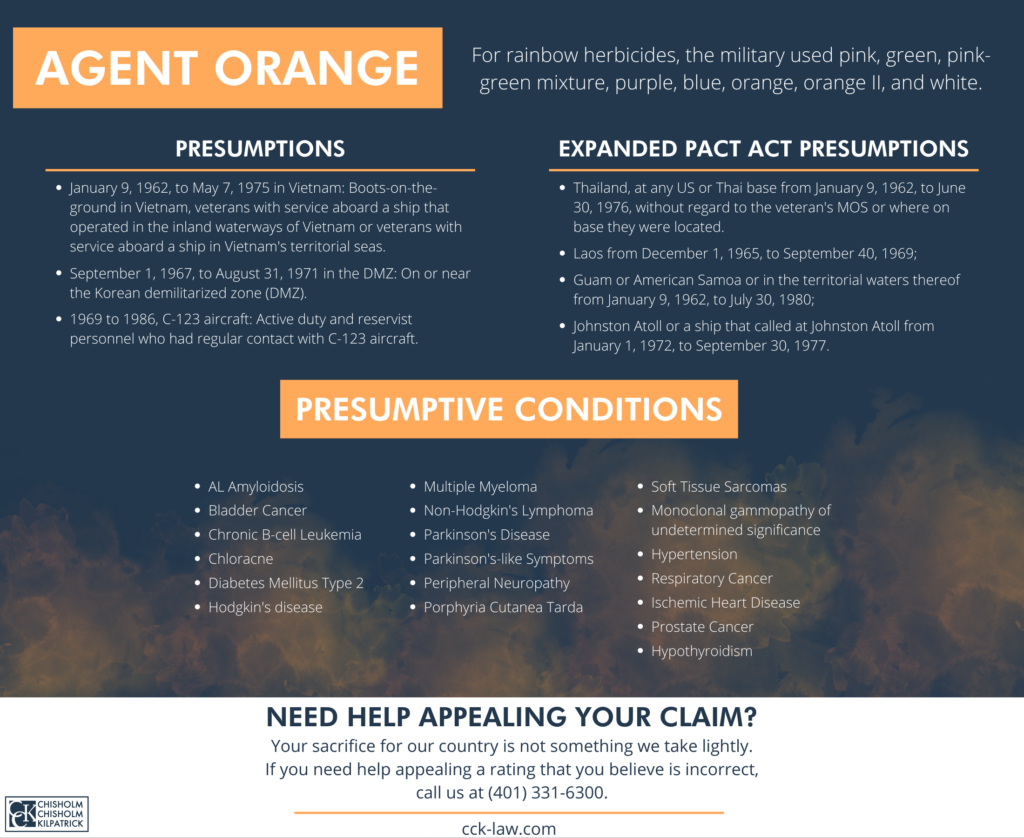Agent Orange Disability Benefits for Kidney Disease

CCK Law: Our Vital Role in Veterans Law
Veterans who have been exposed to Agent Orange may be at risk for developing kidney disease. Those who have developed kidney disease as the result of their exposure may be eligible for VA disability benefits. Continue reading to learn more.
Agent Orange and Adverse Health Effects on Veterans
Many veterans who served in Vietnam, Thailand, Cambodia, Guam, and more were exposed to Agent Orange during their military service. Agent Orange is an herbicide mixture, used extensively throughout the Vietnam War era, which created the highly toxic dioxin contaminant known as 2, 3, 7, 8-Tetrachlorodibenzo-p-dioxin (TCDD) as a byproduct. This dioxin often takes years to break down once it has been released into the environment and can cause a wide array of health effects.

VA’s Presumption of Service Connection for Agent Orange
While VA recognizes the connection between some medical conditions and Agent Orange exposure, it has not formally recognized all diseases that may be linked to Agent Orange.
VA recognizes the following conditions and cancers as being linked to Agent Orange exposure:
- AL Amyloidosis
- Bladder Cancer
- Chronic B-cell Leukemias
- Chloracne
- Diabetes Mellitus Type 2
- Hodgkin’s disease
- Hypertension
- Hypothyroidism
- Ischemic Heart Disease
- Monoclonal Gammopathy
- Multiple Myeloma
- Non-Hodgkin’s Lymphoma
- Parkinson’s Disease
- Parkinson’s-like Symptoms
- Peripheral Neuropathy
- Porphyria Cutanea Tarda
- Prostate Cancer
- Respiratory Cancer
- Soft Tissue Sarcomas
Recently, the Honoring our PACT Act has extended the locations and timeframes of service for veterans to be eligible for presumptive service connection. Presumptive service connection covers veterans who served “with active military naval, air, or space service” in:
- The Republic of Vietnam from January 9, 1962 to May 7, 1975;
- Thailand, at any US or Thai base from January 9, 1962 to June 30 1976, without regard to the Veteran’s MOS or where on base they were located;
- Laos from December 1, 1965 to September 30, 1969;
- Cambodia, specifically at Mimot or Krek, Kampong Cham Province from April 16, 1969 to April 30, 1969;
- Guam or American Samoa or in the territorial waters thereof from January 9, 1962 to July 30, 1980;
- Johnson Atoll or a ship that called at Johnston Atoll from January 1, 1972 to September 30, 1977.
Types of Kidney Disease Veterans Exposed to Agent Orange May Face
- Acute Kidney Disease — This type of kidney disease occurs when the kidneys become unable to filter the blood in the body, which can lead to high levels of waste accumulating in the blood.
- Diabetic Nephropathy — Diabetic nephropathy, or diabetic kidney disease, occurs when diabetes damages blood vessel clusters in the kidneys, limiting the kidneys’ ability to filter water from the blood.
- Chronic Kidney Disease — This refers to the gradual loss of use of the kidneys, meaning that the kidneys can no longer filter waste from the blood and body properly.
- Kidney Cancer — Veteran who face exposure to herbicides like Agent Orange could also develop kidney cancer.
Kidney Disease and Agent Orange: How to Get VA Disability Benefits
To receive VA disability benefits for a kidney condition that is linked to Agent Orange exposure, and not a presumptive condition, veterans first need to establish service connection. To do this, veterans will need to submit VA Form 21-526EZ, and the following:
- A current diagnosis of kidney disease, or another kidney condition;
- A in-service event, or stressor, which caused or contributed to the veteran’s kidney disease;
- A nexus, which links the stressor to the veteran’s kidney disease
In the case of Agent Orange exposure, the exposure could be considered the stressor and the nexus would be medical evidence which links Agent Orange exposure to kidney disease.
Secondary Service Connection
Another method of service connection veterans may utilize to receive VA disability benefits for their kidney disease related to Agent Orange exposure is secondary service connection.
Secondary service connection is when a condition that is already service-connected causes or contributes to another condition.
For example, a veteran may be awarded presumptive service connection for Diabetes Mellitus Type 2 related to their Agent Orange exposure. Then, because of their diabetes, the veteran may go on to develop diabetic nephropathy, a form of kidney disease. As such, veterans can file for secondary service connection for diabetic nephropathy as secondary to Diabetes Mellitus Type 2.
How Does VA Rate Kidney Disease?
VA rates kidney disease under the 38 CFR § 4.115a, Ratings of the Genitourinary System – Dysfunctions, which includes both the organs of the reproductive system and the urinary system. Specifically, kidney diseases are rated using the criteria for renal dysfunction.
There are five rating percentages for renal dysfunction/kidney disease, which are primarily based on:
- Glomerular filtration rate (GFR) estimates
- Severity of symptoms
- Amount of waste (BUN) collected in a blood test
- Amount of albuminuria present in the urine sample
The ratings for kidney disease are as follows:
- 100 percent – “Chronic kidney disease with glomerular filtration rate (GFR) less than 15 mL/min/1.73 m 2 for at least 3 consecutive months during the past 12 months; or requiring regular routine dialysis; or eligible kidney transplant recipient.”
- 80 percent – “Chronic kidney disease with GFR from 15 to 29 mL/min/1.73 m 2 for at least 3 consecutive months during the past 12 months.”
- 60 percent – “Chronic kidney disease with GFR from 30 to 44 mL/min/1.73 m 2 for at least 3 consecutive months during the past 12 months.”
- 30 percent – “Chronic kidney disease with GFR from 45 to 59 mL/min/1.73 m 2 for at least 3 consecutive months during the past 12 months.”
- 0 percent – “GFR from 60 to 89 mL/min/1.73 m 2 and either recurrent red blood cell (RBC) casts, white blood cell (WBC) casts, or granular casts for at least 3 consecutive months during the past 12 months; OR GFR from 60 to 89 mL/min/1.73 m 2 and structural kidney abnormalities (cystic, obstructive, or glomerular) for at least 3 consecutive months during the past 12 months; OR GFR from 60 to 89 mL/min/1.73 m 2 and albumin/creatinine ratio (ACR) ≥30 mg/g for at least 3 consecutive months during the past 12 months.”

How CCK Can Help Veterans with Kidney Disease Exposed to Agent Orange
The experienced veterans’ advocates at Chisholm Chisholm & Kilpatrick have helped veterans with their appeals for VA disability benefits related to Agent Orange exposure and we may be able to help you. Our team can help gather evidence, craft persuasive arguments, and submit documents for your appeal on your behalf. Call our office today for a free case consultation.
About the Author
Share this Post
